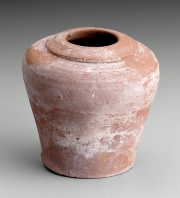Difference between revisions of "Siltstone"
Jump to navigation
Jump to search
(username removed) |
m (Text replace - "== Authority ==" to "== Sources Checked for Data in Record ==") |
||
| Line 16: | Line 16: | ||
B.Aston, J.Harrell, I.Shaw, "Stone" in ''Ancient Egyptian Materials and Technology'', P.Nicholson, I.Shaw (eds.), Cambridge University Press, 2000, p. 57-58. | B.Aston, J.Harrell, I.Shaw, "Stone" in ''Ancient Egyptian Materials and Technology'', P.Nicholson, I.Shaw (eds.), Cambridge University Press, 2000, p. 57-58. | ||
| − | == | + | == Sources Checked for Data in Record == |
* G.S.Brady, ''Materials Handbook'', McGraw-Hill Book Co., New York, 1971 Comment: p. 174 | * G.S.Brady, ''Materials Handbook'', McGraw-Hill Book Co., New York, 1971 Comment: p. 174 | ||
Revision as of 18:28, 1 May 2016
Description
A sedimentary stone of fine-grain, consolidated particles. Siltstone grains usually measure 0.01 - 0.05 millimeters (Aston et al 2000). The grains are composed of quartz or clay cemented with chlorite, mica, epidote, and calcite. The color of siltstone ranges from dark gray to greenish gray. Siltstone does not have the pronounced layering of shale and schist.
Synonyms and Related Terms
siltito (Port.); Siltstein (Deut.); siltsteen (Ned.)
Other Properties
Particle size 0.01 - 0.05 mm
Additional Information
B.Aston, J.Harrell, I.Shaw, "Stone" in Ancient Egyptian Materials and Technology, P.Nicholson, I.Shaw (eds.), Cambridge University Press, 2000, p. 57-58.
Sources Checked for Data in Record
- G.S.Brady, Materials Handbook, McGraw-Hill Book Co., New York, 1971 Comment: p. 174
- Dictionary of Building Preservation, Ward Bucher, ed., John Wiley & Sons, Inc., New York City, 1996
